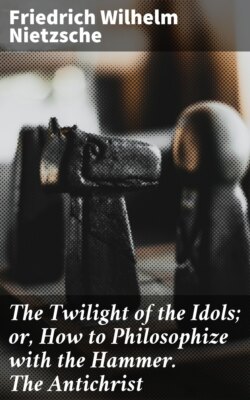Читать книгу The Twilight of the Idols; or, How to Philosophize with the Hammer. The Antichrist - Friedrich Wilhelm Nietzsche - Страница 10
На сайте Литреса книга снята с продажи.
HOW THE "TRUE WORLD" ULTIMATELY BECAME A FABLE THE HISTORY OF AN ERROR
Оглавление1. The true world, attainable to the sage, the pious man and the man of virtue—he lives in it, he is it.
(The most ancient form of the idea was relatively clever, simple, convincing. It was a paraphrase of the proposition "I, Plato, am the truth.")
2. The true world which is unattainable for the moment, is promised to the sage, to the pious man and to the man of virtue ("to the sinner who repents").
(Progress of the idea: it becomes more subtle, more insidious, more evasive—It becomes a woman, it becomes Christian.)
3. The true world is unattainable, it cannot be proved, it cannot promise anything; but even as a thought, alone, it is a comfort, an obligation, a command.
(At bottom this is still the old sun; but seen through mist and scepticism: the idea has become sublime, pale, northern, Königsbergian.)[1]
4. The true world—is it unattainable? At all events it is unattained. And as unattained it is also unknown. Consequently it no longer comforts, nor saves, nor constrains: what could something unknown constrain us to?
(The grey of dawn. Reason stretches itself and yawns for the first time. The cock-crow of positivism.)
5. The "true world"—an idea that no longer serves any purpose, that no longer constrains one to anything—a useless idea that has become quite superfluous, consequently an exploded idea: let us abolish it!
(Bright daylight; breakfast; the return of common sense and of cheerfulness; Plato blushes for shame and all free-spirits kick up a shindy.)
6. We have suppressed the true world: what world survives? the apparent world perhaps? … Certainly not! In abolishing the true world we have also abolished the world of appearance!
(Noon; the moment of the shortest shadows; the end of the longest error; mankind's zenith; Incipit Zarathustra.)
[1] Kant was a native of Königsberg and lived there all his life. Did Nietzsche know that Kant was simply a Scotch Puritan, whose family had settled in Germany?
